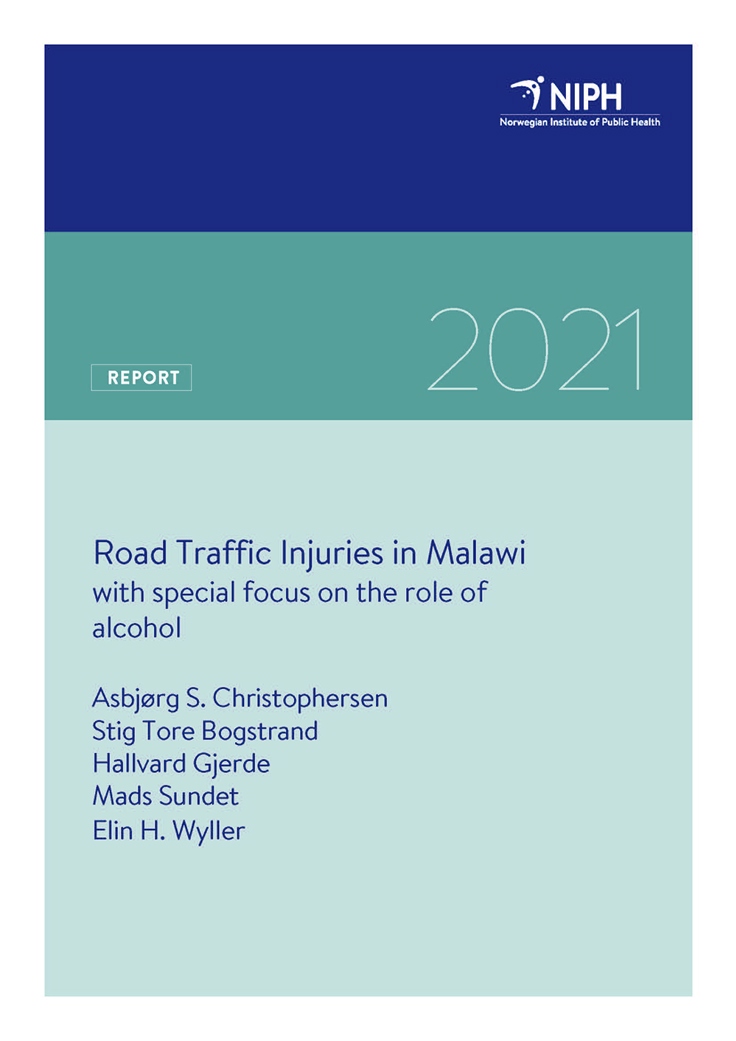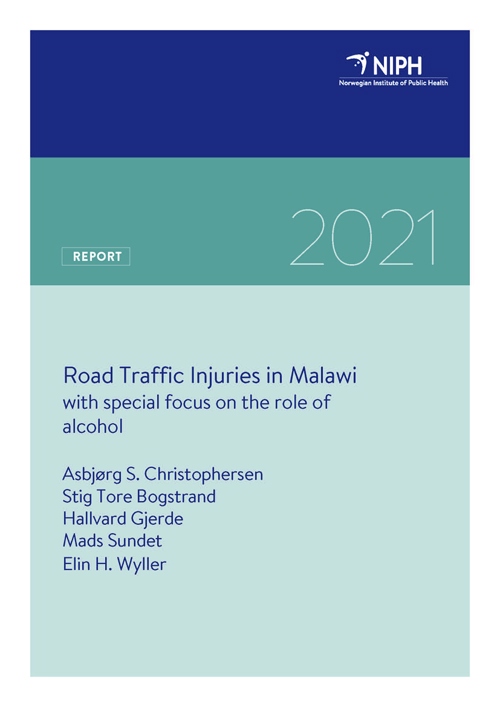Road Traffic Injuries in Malawi – with special focus on the role of alcohol
Report
|Published
The objective of the study was to generate new knowledge about road traffic injuries in Malawi and the extent of traffic accidents related to alcohol use, to increase capacity to conduct alcohol testing, and develop a database for the findings, which in turn will form the basis for future policymaking to reduce traffic accidents.
Summary
Driving under the influence of alcohol is one of the principal causes of road traffic crashes (RTCs) [1]. The use of alcohol is also a risk factor for other road users, such as pedestrians and bicyclists. The association of alcohol in injurious and fatal RTCs has been well documented in most high-income countries, but data for low- and middle-income countries is scarce, particularly for African countries [2].
The study was a collaborative effort between Kamuzu Central Hospital (KCH), the Norwegian Institute of Public Health (NIPH) and Oslo University Hospital (OUH), with the financial support of UK Aid through the Global Road Safety Facility (GRSF) hosted by the World Bank, the International Council on Alcohol Drugs and Traffic Safety (ICADTS) and the Norwegian Council for Road Safety (Trygg Trafikk). The objective of the study was to generate new knowledge about road traffic injuries in Malawi and the extent of traffic accidents related to alcohol use, to increase capacity to conduct alcohol testing, and develop a database for the findings, which in turn will form the basis for future policymaking to reduce traffic accidents.
The objectives were achieved through collecting data on patients who sought treatment after road traffic crashes and admitted to the Emergency Department at KCH in Lilongwe, Malawi. A questionnaire was developed for data collection in cooperation between the project groups in Norway and Malawi. The data included basic information about the patients, alcohol use before the injury, and information about accident circumstances, including types of road users and vehicles involved. Participation was voluntary and anonymous. All weekdays, weekends and nights were covered. Alcohol was measured using a breathalyzer or saliva test for those who were not able to blow. Knowledge and training of local KCH employees to perform alcohol testing and record data were an important aspect of this study.
The project was approved by the National Health Science Research Committee (NHSRC) in Malawi. The Regional Committee for Medical and Health Research Ethics in Norway was consulted, and their conclusion was that no formal application was needed, with reference to the Norwegian Health Research Act Section, §2 and 4a. A Data Protection Impact Assessment was performed as required by NIPH.
There were 1251 patients in the study, representing nearly 95 per cent of those who were asked to participate. The results show a rather high prevalence of alcohol use among several injured road user groups (totally about 25 percent), particularly among those injured during weekend nights and evenings, but also during weekday evenings and nights. It was estimated that about 15 per cent of injured motor vehicle drivers and riders had BACs above the legal limit of 0.8 grams/L at the time of the crash. The findings also show that it is important to focus on bus/minibus/lorry drivers who often carry passengers, where about one out of five tested positive for alcohol. It is worth noting that pedestrians had the highest prevalence of alcohol use before being injured. They constitute a vulnerable group; they often walk in the dark with no road lighting, no pavements, walkways or safe places to cross the road. Combined with alcohol use their injury risk is even higher.
The collected data can contribute to future road traffic safety procedures and measures. The long-term goal is to contribute to sustainable development goal 3, target 3.6, to reduce by half the number of global RTC deaths and injuries.
This study shows the importance of collecting adequate and relevant data for health authorities particularly in low- and middle-income countries in battling the challenge of alcohol-related road traffic crashes, deaths and injuries. Due to the COVID-19 pandemic, a number of recommendations were presented to Malawian authorities at a virtual seminar held in autumn 2020.

